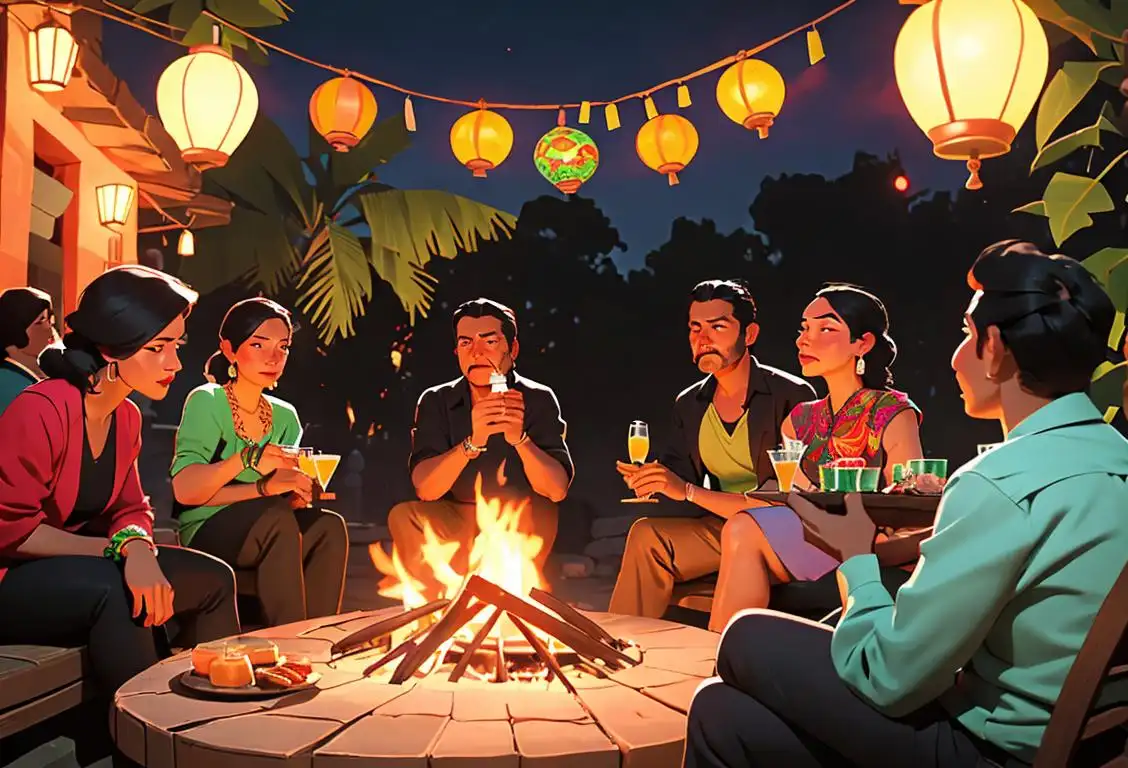National Mezcal Day

Hey there, mezcal enthusiasts! Get ready to raise your glasses high and let the spirit of National Mezcal Day flow through you. This fabulous day celebrates the rich history and flavors of this unique Mexican beverage. So, buckle up and join us on a mezcal-filled adventure!
When is Mezcal Day?
It's national mezcal day on the 21st October.
The Origins of Mezcal
Mezcal, also known as the 'elixir of the gods', traces its roots back to ancient times in Mexico. The name 'mezcal' comes from the Nahuatl word, 'Mexcalli,' which means 'oven-cooked agave.' And let's be clear, we're not talking about those prickly pears you see at the grocery store - agave is a succulent plant native to Mexico and Central America.
Producing mezcal is a labor of love. Agave plants, which take anywhere from 7 to 30 years to mature, are harvested by skilled jimadores (agave farmers) who have perfected the art of extracting the piñas, or the heart of the agave, with a coa de jima, a long-handled tool. The piñas are then roasted in underground pit ovens, giving mezcal its signature smoky taste.
Raise a Glass and Celebrate
National Mezcal Day is a time to appreciate the flavors and craftsmanship behind this ancient spirit. Whether you prefer sipping it neat, indulging in a mezcal cocktail, or using it to level up your cooking, there's a mezcal experience waiting for everyone.
So, grab your friends, loved ones, or even your pet goldfish (as long as they're of legal drinking age... just kidding, pets shouldn't drink!) and let the mezcal celebrations commence. Party responsibly and make sure to hydrate along the way - nobody wants a mezcal-induced hangover on a national holiday.
Fun Fact: Mezcal Magic
Did you know that mezcal is often served with worm salt? Yes, you heard that right! Worm salt, or sal de gusano, is made by grinding up chili peppers, sea salt, and, you guessed it, roasted agave worms. This spicy concoction adds an extra kick to your mezcal experience. Spice up your life, one mezcal shot at a time!
History behind the term 'Mezcal'
16th century
Origins of Agave Distillation
In the 16th century, Spanish colonists brought the technique of distilling agave spirits from Europe to Mexico. This marked the beginning of the rich history of mezcal, a traditional Mexican alcoholic beverage. The indigenous people of Mexico had been fermenting the sap of the agave plant for centuries, but the arrival of the Spanish introduced the distillation process.
17th century
Naming of 'Mezcal'
During the 17th century, the term 'mezcal' emerged as a name for the distilled agave spirits. The word 'mezcal' is derived from the Nahuatl language, spoken by the Aztecs and other indigenous groups in Mexico. In Nahuatl, 'metl' means agave, and 'ixcalli' means cooked. Hence, 'mezcal' can be loosely translated as 'cooked agave.' This name perfectly described the production process of the spirit.
19th century
Regional Variations and Industrialization
During the 19th century, mezcal production in Mexico evolved and diversified. Various regions developed their own unique styles and flavors of mezcal, influenced by factors such as climate, soil, and agave species. Different production techniques, including the use of different types of stills and fermentation methods, also contributed to the regional variations. Additionally, with the advent of industrialization, some producers began using mechanized processes to increase production.
1994
Mezcal as a Protected Designation of Origin
In 1994, the Mexican government granted mezcal a Protected Designation of Origin (PDO), recognizing it as a distinct beverage with specific geographical ties. This designation ensures that mezcal can only be produced in designated regions of Mexico and using traditional methods. It helps preserve the authenticity and quality of mezcal and prevents the use of the term 'mezcal' for spirits produced outside of Mexico or using non-traditional methods.
Present
Renaissance and Global Popularity
In recent years, mezcal has experienced a renaissance and gained popularity worldwide. Its unique smoky flavor profile, artisanal production methods, and cultural significance have captured the attention of spirits enthusiasts and bartenders around the globe. Today, mezcal is not only celebrated in Mexico but also enjoyed in cocktail bars and homes across continents, contributing to the preservation and promotion of Mexican cultural heritage.
Did you know?
Did you know that mezcal is often served with worm salt, a spicy mixture made from roasted agave worms? Spice up your mezcal experience with a pinch of worm salt!Tagged
food fun loved onesFirst identified
21st October 2015Most mentioned on
21st October 2020Total mentions
44Other days
Biscuit Day
Cheese Lovers Day
Cheese Pizza Day
Agriculture Day
Bacon Day
Medal Of Honor Day
Pumpkin Day
Foundation Day
Guac Day
Drink A Beer Day









